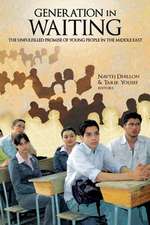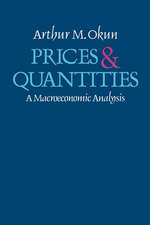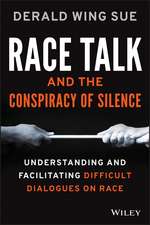Equality and Efficiency: The Big Tradeoff: A Brookings Classic
Autor Arthur M. Okun Cuvânt înainte de Lawrence H. Summersen Limba Engleză Paperback – 30 apr 2015
Originally published in 1975, Equality and Efficiency: The Big Tradeoff is a very personal work from one of the most important macroeconomists of the last hundred years. And this new edition includes "Further Thoughts on Equality and Efficiency," a paper published by the author two years later.
In classrooms Arthur M. Okun may be best remembered for Okun's Law, but his lasting legacy is the respect and admiration he earned from economists, practitioners, and policymakers. Equality and Efficiency is the perfect embodiment of that legacy, valued both by professional economists and those readers with a keen interest in social policy. To his fellow economists, Okun presents messages, in the form of additional comments and select citations, in his footnotes. To all readers, Okun presents an engaging dual theme: the market needs a place, and the market needs to be kept in its place.
As Okun puts it: Institutions in a capitalist democracy prod us to get ahead of our neighbors economically after telling us to stay in line socially. This double standard professes and pursues an egalitarian political and social system while simultaneously generating gaping disparities in economic well-being.
Today, Okun's dual theme feels incredibly prescient as we grapple with the hot-button topic of income inequality. In his foreword, Lawrence H. Summers declares: On what one might think of as questions of "economic philosophy," I doubt that Okun has been improved on in the subsequent interval. His discussion of how societies rely on rights as well as markets should be required reading for all young economists who are enamored with market solutions to all problems.
With a new foreword by Lawrence H. Summers
In classrooms Arthur M. Okun may be best remembered for Okun's Law, but his lasting legacy is the respect and admiration he earned from economists, practitioners, and policymakers. Equality and Efficiency is the perfect embodiment of that legacy, valued both by professional economists and those readers with a keen interest in social policy. To his fellow economists, Okun presents messages, in the form of additional comments and select citations, in his footnotes. To all readers, Okun presents an engaging dual theme: the market needs a place, and the market needs to be kept in its place.
As Okun puts it: Institutions in a capitalist democracy prod us to get ahead of our neighbors economically after telling us to stay in line socially. This double standard professes and pursues an egalitarian political and social system while simultaneously generating gaping disparities in economic well-being.
Today, Okun's dual theme feels incredibly prescient as we grapple with the hot-button topic of income inequality. In his foreword, Lawrence H. Summers declares: On what one might think of as questions of "economic philosophy," I doubt that Okun has been improved on in the subsequent interval. His discussion of how societies rely on rights as well as markets should be required reading for all young economists who are enamored with market solutions to all problems.
With a new foreword by Lawrence H. Summers
| Toate formatele și edițiile | Preț | Express |
|---|---|---|
| Paperback (2) | 161.86 lei 6-8 săpt. | |
| Brookings Institution Press – mai 1975 | 161.86 lei 6-8 săpt. | |
| Brookings Institution Press – 30 apr 2015 | 179.34 lei 6-8 săpt. |
Preț: 179.34 lei
Nou
Puncte Express: 269
Preț estimativ în valută:
34.32€ • 35.70$ • 28.33£
34.32€ • 35.70$ • 28.33£
Carte tipărită la comandă
Livrare economică 14-28 aprilie
Preluare comenzi: 021 569.72.76
Specificații
ISBN-13: 9780815726531
ISBN-10: 0815726538
Pagini: 156
Dimensiuni: 140 x 216 x 10 mm
Greutate: 0.23 kg
Ediția:Revised
Editura: Brookings Institution Press
Colecția Brookings Institution Press
Seria A Brookings Classic
ISBN-10: 0815726538
Pagini: 156
Dimensiuni: 140 x 216 x 10 mm
Greutate: 0.23 kg
Ediția:Revised
Editura: Brookings Institution Press
Colecția Brookings Institution Press
Seria A Brookings Classic
Notă biografică
Arthur Melvin Okun is widely considered among the most important macroeconomists of the twentieth century. Born in 1928, in Jersey City, New Jersey, he received his A.B. and his Ph.D. from Columbia University and went on to teach economics at Yale University. In the 1960s he served as a senior economist, member, and, finally, as chairman of the Council of Economic Advisers in the Kennedy and Johnson administrations.
When Okun left the CEA, he joined the Brookings Institution. In 1970, he cofounded, with George Perry, the Brookings Papers on Economic Activity (BPEA), which is still among the world's most prestigious economic journals and currently boasts sixteen Nobel Prize winners among its authors.
Known for his wit as well as his compassion, Okun reacted to surging inflation in the 1970s by developing an economic indicator he dubbed the Misery Index, which charted the well-being of Americans by combining the unemployment rate and inflation rate. In the years since, Okun's idea of indexing misery has been both repurposed and refined to track happiness and well-being across all sorts of indicators.
When Okun died unexpectedly at the age of just 51 in March 1980, he was hailed as an innovative and effective policy economist who was unique in holding the respect and admiration of both academic economists and practical politicians.
Okun is today remembered as an effective mediator between the realms of economic theory and analysis and the development and implementation of public policy. In this realm, Equality and Efficiency: The Big Tradeoff, with its difficult questions about the uneasy relationship between capitalism and democracy, is most certainly Okun's masterwork.
When Okun left the CEA, he joined the Brookings Institution. In 1970, he cofounded, with George Perry, the Brookings Papers on Economic Activity (BPEA), which is still among the world's most prestigious economic journals and currently boasts sixteen Nobel Prize winners among its authors.
Known for his wit as well as his compassion, Okun reacted to surging inflation in the 1970s by developing an economic indicator he dubbed the Misery Index, which charted the well-being of Americans by combining the unemployment rate and inflation rate. In the years since, Okun's idea of indexing misery has been both repurposed and refined to track happiness and well-being across all sorts of indicators.
When Okun died unexpectedly at the age of just 51 in March 1980, he was hailed as an innovative and effective policy economist who was unique in holding the respect and admiration of both academic economists and practical politicians.
Okun is today remembered as an effective mediator between the realms of economic theory and analysis and the development and implementation of public policy. In this realm, Equality and Efficiency: The Big Tradeoff, with its difficult questions about the uneasy relationship between capitalism and democracy, is most certainly Okun's masterwork.
Descriere
Originally published in 1975, Equality and Efficiency: The Big Tradeoff is a very personal work from one of the most important macroeconomists of the last hundred years. And this new edition includes "Further Thoughts on Equality and Efficiency," a paper published by the author two years later.
In classrooms Arthur M. Okun may be best remembered for Okun's Law, but his lasting legacy is the respect and admiration he earned from economists, practitioners, and policymakers. Equality and Efficiency is the perfect embodiment of that legacy, valued both by professional economists and those readers with a keen interest in social policy. To his fellow economists, Okun presents messages, in the form of additional comments and select citations, in his footnotes. To all readers, Okun presents an engaging dual theme: the market needs a place, and the market needs to be kept in its place.
As Okun puts it: Institutions in a capitalist democracy prod us to get ahead of our neighbors economically after telling us to stay in line socially. This double standard professes and pursues an egalitarian political and social system while simultaneously generating gaping disparities in economic well-being.
Today, Okun's dual theme feels incredibly prescient as we grapple with the hot-button topic of income inequality. In his foreword, Lawrence H. Summers declares: On what one might think of as questions of "economic philosophy," I doubt that Okun has been improved on in the subsequent interval. His discussion of how societies rely on rights as well as markets should be required reading for all young economists who are enamored with market solutions to all problems.
With a new foreword by Lawrence H. Summers
In classrooms Arthur M. Okun may be best remembered for Okun's Law, but his lasting legacy is the respect and admiration he earned from economists, practitioners, and policymakers. Equality and Efficiency is the perfect embodiment of that legacy, valued both by professional economists and those readers with a keen interest in social policy. To his fellow economists, Okun presents messages, in the form of additional comments and select citations, in his footnotes. To all readers, Okun presents an engaging dual theme: the market needs a place, and the market needs to be kept in its place.
As Okun puts it: Institutions in a capitalist democracy prod us to get ahead of our neighbors economically after telling us to stay in line socially. This double standard professes and pursues an egalitarian political and social system while simultaneously generating gaping disparities in economic well-being.
Today, Okun's dual theme feels incredibly prescient as we grapple with the hot-button topic of income inequality. In his foreword, Lawrence H. Summers declares: On what one might think of as questions of "economic philosophy," I doubt that Okun has been improved on in the subsequent interval. His discussion of how societies rely on rights as well as markets should be required reading for all young economists who are enamored with market solutions to all problems.
With a new foreword by Lawrence H. Summers


















